#and isn't condemned by the narrative
Text
Antis: "The Darkling was cruel! He killed, manipulated, lied and forced himself to Alina!"
*Meanwhile the antis when Nikolai cut the fingers of a man, decided to usurp the throne, lied to Alina, hid information from her and kissed her without consent:* "Now isn't he a cutie?🥰😭"
#ahh how much I love hypocrisy 😍#apparently the readers don't mind all that as long as the character doesn't wear black. isn't the antagonist#and isn't condemned by the narrative#his real stans are those who treat him as the character he is. A gray one.#the darkling#pro darkling#nikolai lantsov#aleksander morozova#pro aleksander morozova#alina starkov#grishaverse trilogy#shadow and bone#grishaverse#siege and storm
58 notes
·
View notes
Text
💖💜💙
i hope the folks planning on resurrecting Supernatural [re:jackles] are taking notes on what's happening in the 9-1-1 fandom and with this Buck character right now. i know next to nothing about this show, but i do know that 'Buddie' is a major mlm ship between two guy friends and that this guy Buck - a strong macho man in his 30s - has just been canonised as BISEXUAL! with a MLM kiss! after SIX seasons! the subtext was there all along but the network was not on board, by the sounds of it; a change of network saw this queercoded middle-aged male character finally set free. no more subtext, no insinuations that could be interpreted one way or another, just undeniable beautiful text.
i'm thrilled for everyone in the 9-1-1 fandom and for this positive queer rep in media! here’s hoping other shows will take note - namely Supernatural. Dean has 15 seasons of queer subtext under his belt and he would now be in his mid 40s. it’s never too late to canonise a queer character. characters are never too old to realise they’re queer. this is such an important message, and while i can’t speak for the buckgirls i can say that queer deangirls have been relating to his queercoding for almost 2 decades, including 15 seasons of bi!Dean and 12 seasons of Destiel. seeing a character like Buck come out as queer after SIX seasons (i’ll keep saying it, it’s fucking amazing) is such a win not just for queer folk but for good storytelling; i know there were likely obstacles in finally getting here, and it would be great if queer characters could come out whenever they want instead of struggling against tptb, but six seasons has given the show a wonderful amount of time to delve into Buck’s character and journey with him through various plotlines. as a fan of the slow burn for romance, and a good amount of time for character development to play out, i love that there’s six whole seasons of Buck backstory to delve into for the leadup to his bisexual canonisation.
happy bi day Buck, may you inspire more creative control to cater to the characters instead of some suit in an office who’s never even seen your show and doesn’t care about your journey and narrative freedom. today is a great day.
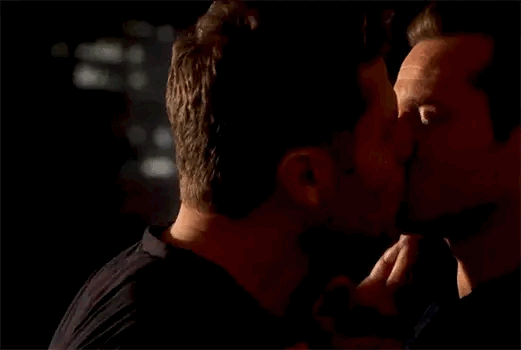

(the first gif is Buck’s first mlm kiss. the second gif is a moment from a gay comedy called Looking that many people have pointed out perfectly encapulates how a Destiel kiss might play out on screen.)
💖💜💙
#dean is bi#let him be free#spn posting#911 buck is bi#thoughts#spn reboot#can i also just say: it's so good to see a character who wasn't written explicitly as the queer character yknow? this isn't some#teenbeat coming of age drama with a queer character reveal in season 1 and a queer ship canonised in season 2#we're talking SIX WHOLE SEASONS of character development - watching this guy grow and how his#relationships with others change and evolve over YEARS of storylines. it's unknown whether buddie will#be canonised but that's secondary. this is a huge milestone for queer characters and bisexual (male) characters#moreover in a show that isn't made for teens or centred on queer identities. this guy was allowed to BE#and honestly that's more than what castiel. castiel was killed off for his queerness and then they#killed dean too rather than let him be queer. but with 911 - the show is ongoing! it's not an endtimes reveal#it's going to be allowed to exist in the narrative moving forward meaning everyone who saw the#queercoding of his characters for SIX whole seasons is seeing it come to fruition. the meta was there#and it's not belittled or ignored or criticised or condemned but embraced and celebrated and rewarded!#it's never too late#for characters or long-running shows to be allowed to be true to their narrative#destiel
14 notes
·
View notes
Text
coming crawling out of black sails s3e1
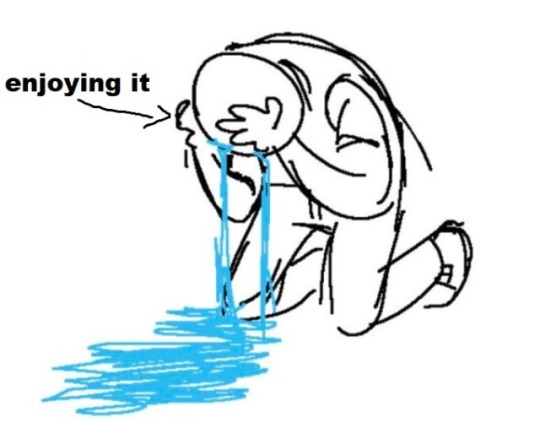
#black sails#i wrote a whole essay on like. messaging in the gc losing my mind but idk if anyone on here wants to read it#the like. just. the way the show frames that change from flint's hope to be able to *somehow* negotiate/find a solution#to his single-minded rage#and how i am OBSESSED IN LOVE SO GRATEFUL for it not having this immediate heavy-handed condemnation of it#how the narrative isn't even only sympathetic but like. downright approving at times? like#i mean. obviously we know how this story ends even without spoilers irt england. spain. piracy. colonialism. etc etc#but like. yeah. yeah. not repeating this in the tags of all places but might clean it up and post it tomorrow#idk idk losing my mind going insane chewing through a brickwall just !!!!!!!!!!!!!!!
14 notes
·
View notes
Note
wipgame: Barb Lives Side A (Alive) [i'm barely on the periphery of ST but i know that this was Unjust]
From this
“Let them think I’m dead. They were never going to give my parents a body to bury anyway.”
“But your parents--”
“Are never going to believe that I just ran away after all once they get a good look at me. What the fuck am I supposed to tell them?” And she gestures to the scars left over from her time in the upside down, the pattern of shallow stab wounds like a bed of nails wrapping around her right forearm, the discoloration from burns on her hands. “That I got mauled by a mountain lion? That’s believable.”
“So you just want them to grieve you even though you’re not dead?”
“Yeah, Nance! Yeah, I fucking do. I want them to grieve and move on with their lives and skip town and not get involved with this bullshit.”
#wip wednesday#no tag for this fic yet#part of the point of this fic + Trapped is like. The idea of how messy it would be for Barb to have been alive#but assumed dead + have her death still affect the narrative (particularly the social dynamics of post-s1 through to the finale of s2)#while also like. having survived and having messy feelings about not having been saved and having had the worst days of her life happen#partially because her best friend wanted to fuck a boy and not listen to her advice#like a dead girl can't forgive really but she can't condemn either. sort of thing.#the other point of this AU is that I want Barb + Will to interact#the rest of the point of these AUs is to be extremely self indulgent#anyway this scene in particular is about the fact that by the time Nancy learns that Barb isn't actually dead#she's already sent the 'chemical leak' story to the press#in order to be able to tell Barb's parents that she's dead and get them some closure#no easy peacetime girl here to be found
2 notes
·
View notes
Text
So there's this post with a troubling number of notes going around insisting that "dead dove" is not a genre, it doesn't inherently have anything to do with darkfic, and that the tag could be applied to fics that are "100% fluffy where everyone's having a good time" if they happen to contain some abnormal (though entirely non-problematic) content like an unusual kink. The claim is that "dead dove: do not eat" is simply a "courtesy tag" that means "this is a very specific niche, mind the tags." And that's just... wrong.
I wrote up a whole rebuttal to this post since I can't stand misinformation and frankly OP was being kinda rude and judgey on top of their wrongness. But right after I posted my reply, OP turned off reblogs because, and I quote, “some fuckwad added some dumb shit onto this post and it is no longer educational” (the “fuckwad” being me and the “dumb shit” being proof that they were wrong). A couple people have asked me to make a rebloggable version of my response, which I've decided to do because this isn't the first time I've heard similar claims and I want to help set the record straight. However, I'm not linking the original post on the off chance this gains traction because OP did the right thing by turning off reblogs, preventing it from circulating further, and I don't want them to get hate for being unfortunately misinformed.
For those who don't know the history, "dead dove: do not eat" was originally proposed as a catchall "hydra trash party" alternative label for any fandom to warn that the content of a fic may be considered problematic or potentially upsetting and to read the tags carefully so you know what you're getting into and won't complain later. Specifically, DD:DNE was intended to convey that the Bad Things in the fic would likely be reveled in and not explicitly condemned by the narrative, which some people tend to get up in arms about, hence the need for the extra warning in addition to the tags. Don't believe me? Here's the original proposal (note DD:DNE can be found on a handful of fics dated before 2015 but this is when it really took off and became a Thing).
There are currently around 50,000 fics tagged as "dead dove: do not eat" on AO3 and close to 50% of those also include the rape/noncon warning (which of course is not the only type of "dead dove" but is one of the most popular and most consistently tagged). The normal percentage of noncon fics in any given fandom? Around 1-3%. That's a HUGE disparity. So don't tell me that dead dove is just a general "courtesy tag" and doesn't or shouldn't have dark connotations. Even the context of the original joke on Arrested Development has a dark undertone. Micheal Bluth casually finds an animal carcass in a bag in his refrigerator with the label "do not eat", as if eating it would be any sane person's first thought. The whole situation is kinda fucked up. And this fucked up vibe very much carries over into fandom usage too, as was intended.
The claim that dead dove has nothing to do with the content's genre and could just as easily be used to describe a 100% fluffy fic in which everyone's having a good time is straight up Wrong, or at the very least, severely warping the original meaning. Also, when someone these days says that they like/dislike "dead dove" most people in fandom automatically understand what that means because of the consistency of its usage over the years and the way language evolves. Whether you like it or not, "dead dove" IS a genre now and the term does carry a specific connotation. I do agree that DD:DNE should definitely still be used in conjunction with other tags, when applicable, to be explicit about the exact type of fucked up content you may find, but to say that the term is meaningless on its own is patently false and I'm tired of people who don't know what they're talking about pushing this narrative and causing even more confusion.
You want a generic term that also means "mind the tags" and doesn't have any inherently dark connotations? Just use good ol' "what it says on the tin" instead of trying to force dead dove to be something it's not.
#fyi I've tweaked my response slightly to remove specific references to OP and make it read better on its own#I hope I don't regret making this post and inviting The Discourse#but dead dove is a topic that is very near and dear to me#I feel like someone has got to say something and put a stop to all of the misinformation around it these days#fandom#long post#my words#psa#wendy's help desk
3K notes
·
View notes
Note
Please, talk to me more about Barbie being aroace.
not once, not a single time in 113 minutes of runtime, did Margot Robbie's Barbie show romantic or sexual interest in Ken—or anyone else, for that matter!
first of all, it's kind of amazing that there was no romantic storyline whatsoever for a female lead (especially one who's so often culturally thought of in a pair—Barbie and Ken) in one of the biggest movies of the year.
it also stands out because we see some of the other Barbies paired up with Kens, seemingly romantically, which implies that Barbies CAN be allo, but this particular Barbie isn't! she explicitly says that she's not interested in Ken that way!!
and obviously they never say the words "aromantic" or "asexual" in the film bc it's hollywood and most people don't really understand what that means anyway. but at least in my mind, a story doesn't have to have explicit representation in order for me to feel seen and validated by it. if nothing else, Barbie is an incredibly aroace-friendly story, not only because of its lack of romance, but because the main character doesn't want a relationship and is never questioned about this (other than by Ken, which the narrative resoundingly condemns), or told that she's supposed to or she should at least give it a try, or any number of the things that aro and ace people hear all the time.
anyway, thanks for coming to my ted talk, and go watch Barbie (2023)
1K notes
·
View notes
Note
In regards to your post on Izuku’s self sacrificial traits, how do you think the dark hero arc plays into this? I thought the point of it was to sort of pull his self sacrificial nature back a bit with the whole “you can’t do it on your own” and “don’t kill yourself for the cause” thing. They don’t have to be mutually exclusive, i get that “bakugou looks up to Deku’s self sacrificial nature as a positive trait he doesn’t have” and “Deku should rely on others and not hurt himself” can both coexist. But they also give mixed messages narratively. Is one not condemning it while the other puts it on a pedestal?
THANK YOU!!! For taking the bait.

I've been ranting about this theme a bit because, from what I can tell, it might be the biggest point MHA is trying to make to answer the question "What is a hero?" Because of MHA's length, the points of the argument have been rather spread out. I think people's understanding of the argument has been distorted by the length of time between the points. Overthinking is the enemy here.
But really, why are people coming away from MHA with the message "Heroes shouldn't sacrifice themselves"? The message is coming from somewhere. The problem is it's probably coming from a conflation of concepts. What is self-sacrifice? That's the question that gets at the root of the problem here.
In the west, "sacrifice" has negative connotations. "Something is lost." "Someone suffers for the sake of a goal." "Someone gives up something." The focus is entirely on the pain experienced by the one sacrificing.
But the point MHA is trying to make is that there's a difference between "suffering loss" and the sacrifices a true hero makes. Izuku isn't a remarkable hero because he's willing to destroy himself at the drop of a hat. The focus is not on his drastic behavior but on the recipients of his drastic behavior. The point is, sacrifice for the sake of sacrifice is meaningless, but sacrifice for the sake of others, well, now we're getting somewhere.
It's the "for the sake of others" part that matters here. Izuku is a hero because he cares for others, because he wants to save others, and what he's willing to sacrifice to accomplish that is merely the measure of his conviction, of his heart.
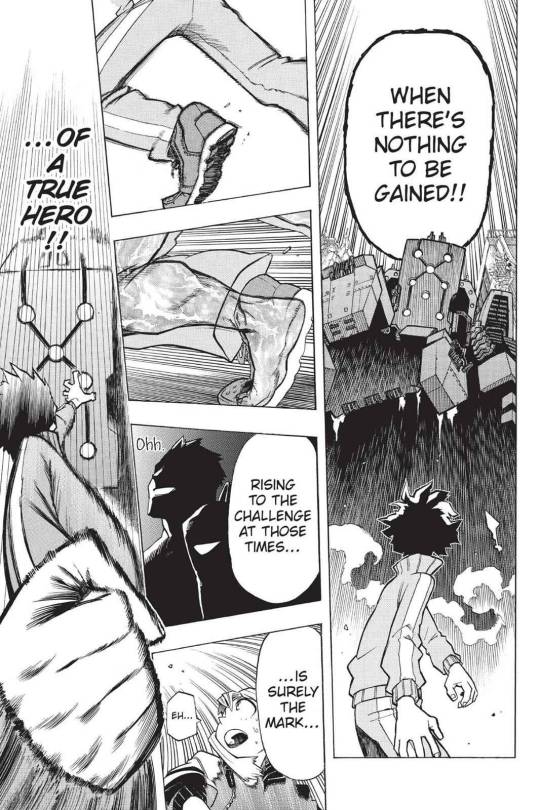
The quality of self-sacrifice is a core trait measured just to gain enrollment at UA, the most prestigious hero school in the country. Self-sacrifice is fundamental to being a hero. Do you really think the point of the MHA story is to demonstrate how self-sacrifice is a bad thing, that heroes shouldn't sacrifice themselves? Do you think the rest of Class 1-A wouldn't be willing to sacrifice themselves should the need arise so long as it's in order to save someone?
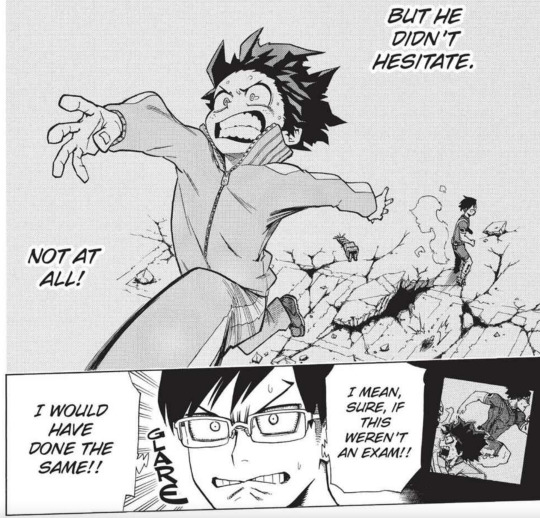
The difference between Izuku and the rest of the world, at least at the beginning, is that he is sensitive to calls for help. He is able to perceive those in trouble that others cannot perceive. Others get confused by the context or are not in a constant state of listening for cries for help. Others cannot always tell when is the right time to act or if acting is the correct choice. Izuku never wavers in the face of such questions. He always acts, because he cannot help but act. It is who he is. It's his nature to be this way. And this is the spirit that slowly influences his classmates and the rest of society, this is the spirit Katsuki fears and later comes to emulate, this is the ideal Izuku admires in his hero All Might for which he always strives.
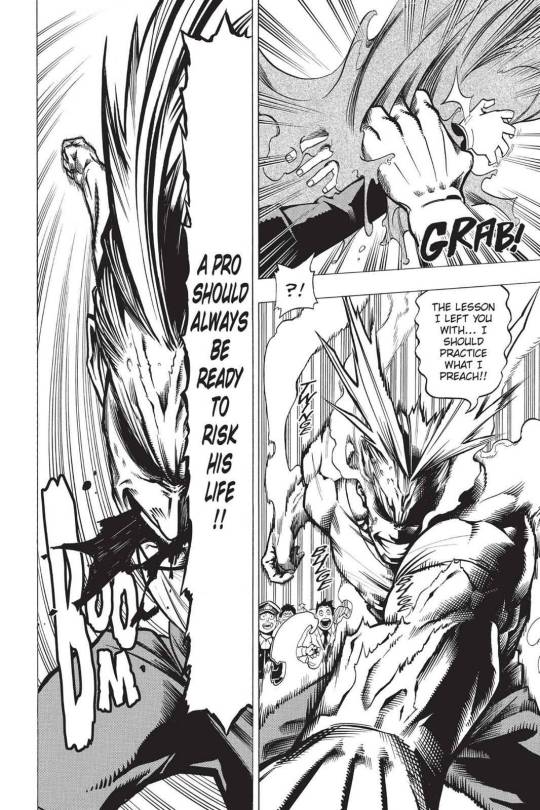
Heroes want to save, but some of them just don't know how--and Izuku teaches them how. Izuku teaches them that, for true heroes, to save others is more important than anything else they could ever want. It is more important than their self-perceived weaknesses, than their egos, than their desires for vengeance, than their small-time dreams, no matter how noble or justified or important any of those things might be. To be called a hero, one must be prepared to risk it all.

These are the traits Hero Killer Stain wishes to promote in society. These are the qualities he exonerates from assassination. A person who lives for the sake of "service to others" is the sort of person who has more right than anyone to "cling desperately to life." Society needs such people, and for that very reason such people need to stay alive. This is the collectivist ideal. If everyone is concerned for the well-being of others, then everyone is looking out for everyone else. If you're ready to save others and risk yourself to do so, others will risk themselves to make sure you make it out alive too, and thus everyone is protected. If you do end up perishing due to self-sacrifice, it is a tragedy, not self-determination, but then your actions still protected the whole, and the whole will continue to protect everyone in it to the best of their abilities because your self-sacrifice was appreciated and the spirit of your goodness carries on in others.
But that's a whole lot of waxing poetic about self-sacrifice. I did acknowledge that people are picking up a critical message. Where then is the criticism?
It comes from Shouta Aizawa.
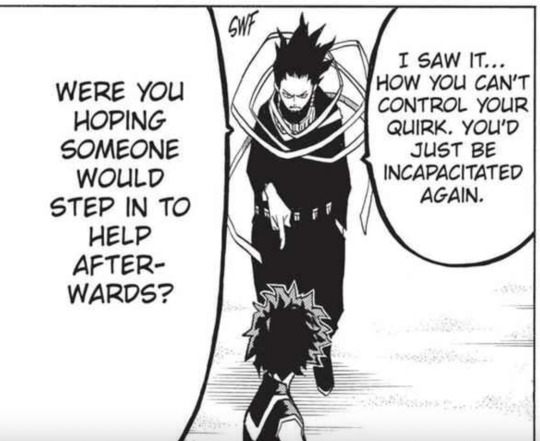
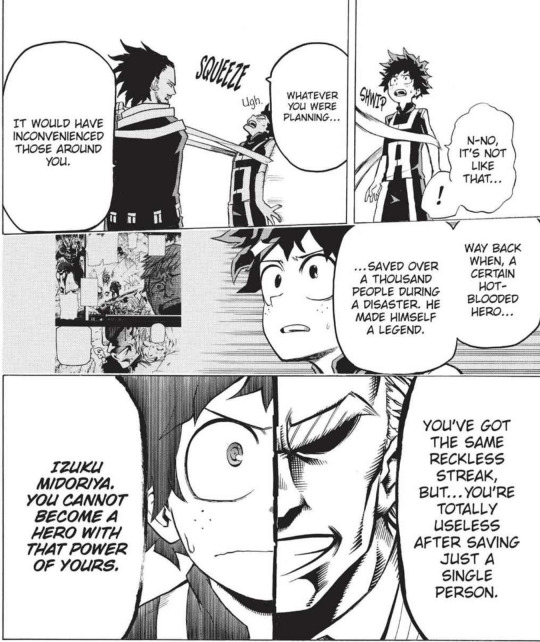
Aizawa is the major proponent of rationality in this case. Self-sacrifice = good is not the end of the philosophy. It is as you say, something must balance it out.
People often think Aizawa's philosophy boils down to "I don't want heroes to be self-sacrificial," but that's not actually what he's saying. Aizawa's philosophy is to make the distinction between self-sacrifice and self-destruction.
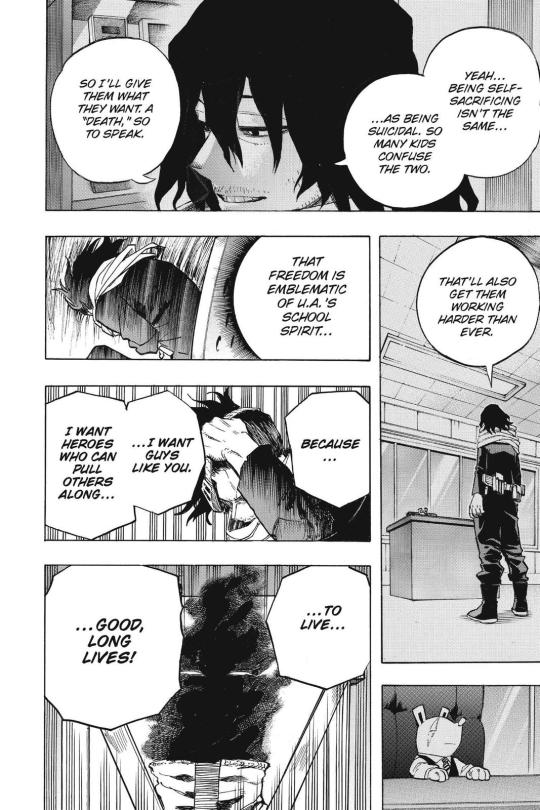
"Being self-sacrificing isn't the same...as being suicidal. Many kids confuse the two. So I'll give them what they want. A 'death,' so to speak."
The hallmark of heroic self-sacrifice is that it's done for the sake of others. Self-destruction is different; it is for the sake of the self. Some people would take the chance to mask their self-destruction as self-sacrifice by looking for a way to die while saving others. That's not the point of heroic self-sacrifice. Self-sacrifice is a last resort. You save a person in trouble because you care about preserving their well-being no matter the cost, but some sacrifices are not in balance. Say someone is trapped in a room and you want to get them out, and you have a battering ram and a bomb. Should you strap a bomb to your body and explode open that door to let the person out? Wouldn't that be a heroic sacrifice to save someone? No! It's certainly a sacrifice, but it's not a heroic one. You should act to preserve ALL well-being, including your own. Use the damn battering ram.
Consider the circumstances at play in the quirk assessment test. Izuku was ready to sacrifice his entire arm, his physical constitution, for the sake of demonstrating his power. What does Izuku incapacitating himself achieve were Aizawa to let him do so? It would merely be to prove his strength to someone. No one is at risk here. No one needs saving. Izuku has no person to receive the good will of his self-sacrifice.
"Whatever you were planning...it would have inconvenienced those around you."
"You're totally useless after saving just a single person."
Self-sacrifice is still a sacrifice, which means it has costs and consequences. Who loses because of self-sacrifice? Many people. The person who sacrifices themself loses their life or well-being, which, if others asking for help are worth saving because you believe all people are equal, then you are also worth saving and in just as much need of help. Additionally, your loved ones are harmed because they care about you. And the rest of society suffers because it was better for having you in it; you can no longer save anyone else. To save the most people possible, a hero should strive to survive. A hero should strive to win.

Taken all together, you get the philosophy that allows Katsuki's team to triumph during the Joint Training Arc, which was the entire point of this match. Note how all the above logic is summed up quite succinctly by the gremlin himself.

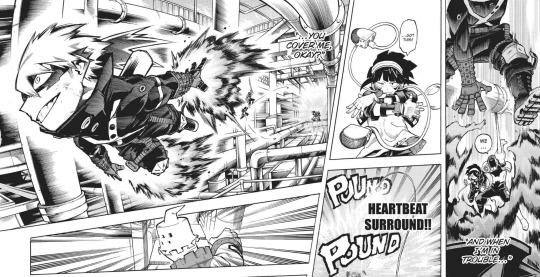
Katsuki is dedicated to winning the match and leads the charge, but that puts him at risk of being targeted. However, he's willing to be in that vulnerable state because he trusts others to save him. That's what empowers him to put himself on the line. His goal is a complete victory, which means that self-sacrifice is considered a loss. There are costs and consequences, and heroes should do their best to mitigate them. Katsuki is doing everything in his power to reduce the necessity of self-sacrifice, but not because he thinks self-sacrifice is bad. He thinks needless self-sacrifice is bad, and so he strives to eliminate the need for it.
But that means he does acknowledge that there are times self-sacrifice is necessary. He's grown up afraid of Izuku's heart because Izuku demonstrates how easily self-sacrifice comes to him, and that puts Katsuki on the spot. Katsuki doesn't know if he is capable of self-sacrifice. Because he's so competent and strong, he's never noticed a need for sacrifice in his life. He's never had to demonstrate self-sacrifice, and if that's such a fundamental part of being a hero, Katsuki doesn't know if he really is a hero at heart.
But as I mentioned above, the reason he never had a chance to display self-sacrifice as a trait is because he lacked the ability to tell when people need saving. He looks around and sees a bunch of people who are wasting their potential. He thinks some people who seem to ask for help are much more capable than they behave.
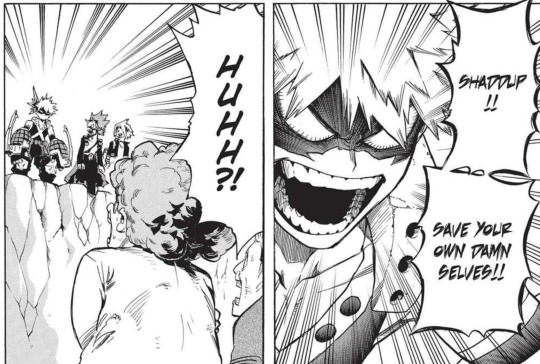
Note how Katsuki failed his hero license exam. If Katsuki had stuck around the triage center and fought Gang Orca when he showed up, Katsuki likely would have passed. But Katsuki decided to forego battle to run around and save people. And hilariously enough, the bystanders who dock Katsuki points point out that Katsuki correctly identified them as low-priority targets to save. He's pretty good at figuring out who DOESN'T need saving. They end up docking him points because of his inappropriate tone, which is possibly the funniest way they could have said "Well you're technically right but also holy crap you're bad at this."
And that's the point. Katsuki knows saving people is important, and he perceives Izuku is the absolute best at it. Katsuki is constantly looking for a way to compete with Izuku in this realm because he has to. Katsuki wants to be the best, and to do so he has to improve in this area. Izuku pisses him off because he is extremely adept at perceiving calls for help from those who truly need it, and Katsuki notices every time Izuku is faster on the uptake. It happens at the sports festival with Shouto, which is why Katsuki considers the sports festival a loss.
Katsuki does get better at this, and that's what allows him to eventually get his hero license. Think of his behavior during the school cultural festival, where he sees his classmates trying to appease their peers out of guilt. That's people pleasing. That's ego. Katsuki won't have any of it. From his perspective, if Class 1-A wants to make sure everyone has a good time, then everyone means everyone. Class 1-A has to enjoy the festival too, and the best way to do that is to throw a badass concert. By enjoying themselves and being proud of their well-earned accomplishments, by thriving, Class 1-A demonstrates to their peers how to best win against all those tragedies that tried to bring them down. Self-deprecation for the sake of appeasing others' ill will when that ill will is unjustified is just self-gratification. It's just a way to stop feeling guilty, but the only purpose that serves is to debase yourself. Class 1-A didn't do anything wrong to the other classes, so Class 1-A does not need to atone to them. Self-sacrifice in this case brings no benefit to anyone. Instead, the classes should all be thriving together.
All of these lessons converge in the Dark Deku arc. Others express worry for Izuku's behavior because they see him as engaging in self-destruction. They want him to rest, but Izuku perceives there are people in need of help, so he can't help but save them. And not everyone condemns Izuku's behavior.
Kudou encourages it.
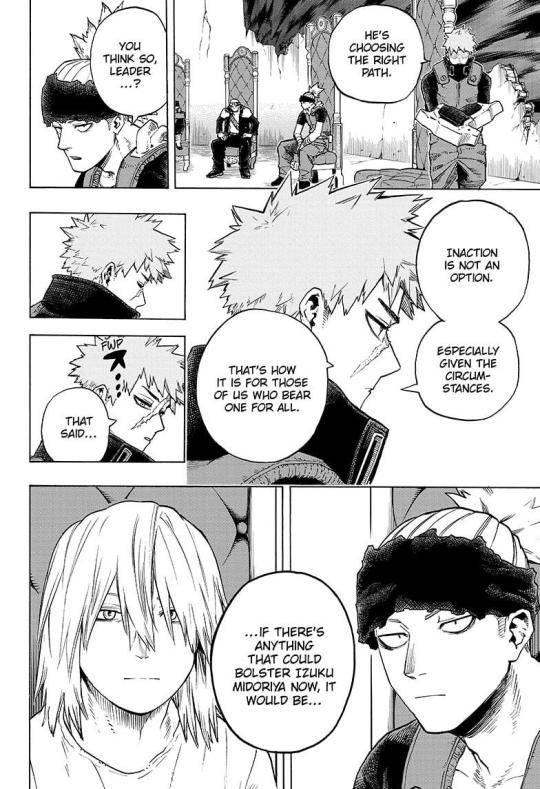
The problem at play in this arc is the question of power. Izuku has power, which means he is capable of saving people. And many people are in need of saving. How many people can one finite Izuku save? That is the question he is set to answer. He is facing the same question as All Might, but All Might's example was to save people while he was losing One For All. All Might had a finite amount of power that he was going to lose in time, so he decided to spend that dwindling power on saving as many people as he could. That would be the more virtuous use of his finite power.
But All Might's flaw was in rejecting the help of others when others were capable of helping him. Izuku falls into the same trap. He thinks he has to save people alone because he's the only one capable of it.
This is Kudou's spoken caveat. "Inaction is not an option," so yes Izuku needs to be acting in this moment. "That said...if there's anything that could bolster Izuku Midoriya now, it would be..."
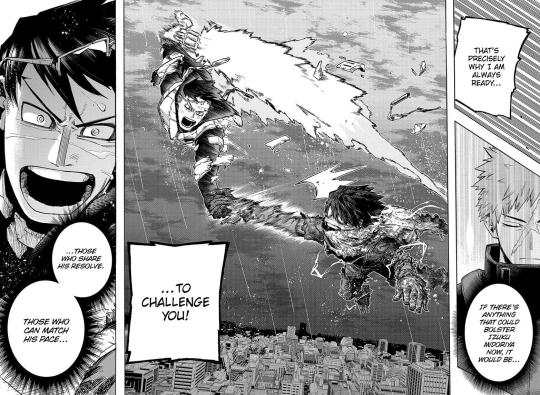
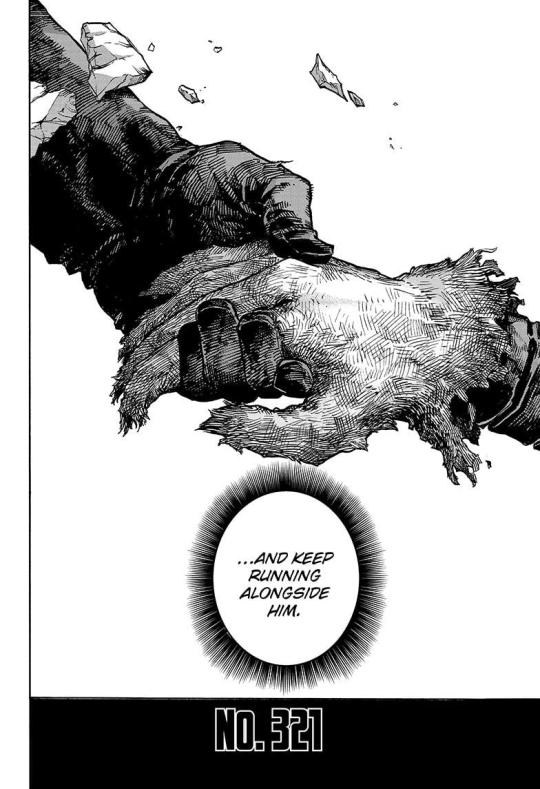
The answer is not merely "friends." We are given the answer that Izuku needs friends at first, but this is a special type of friend. Izuku needs friends who "share his resolve," who "can match his pace...and keep running alongside him." Izuku needs comrades (nakama)! He needs friends who want to save just as much as he does. He needs friends who are just as capable as he is. That's why Class 1-A has to first demonstrate their capabilities to Izuku so that he can be convinced.
Katsuki doesn't criticize Izuku's ideals either. In fact, he openly praises them.
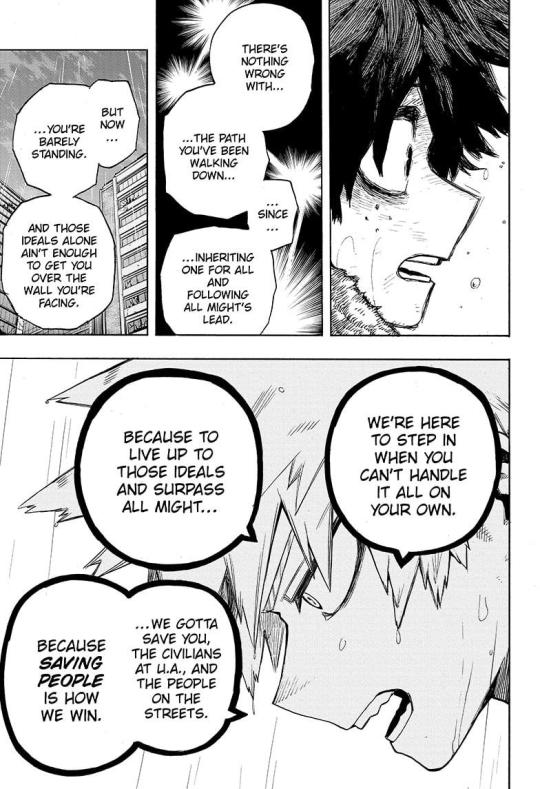
All Katsuki is saying here is "You're doing the right thing. Saving people, even at cost to yourself, is the right thing. We want to help. We can help. Don't reject us.
"Don't pay a price when you don't have to."
tl;dr
In a collectivist society, the ideal is that everyone looks out for each other, thus is everyone protected.
Self-sacrifice has costs to the self, to one's loved ones, and to society. The price paid must be worth the good achieved.
The virtue in self-sacrifice is that it is done when necessary for the sake of others. Anything less is self-destruction, which is harmful to society.
Heroes have a duty both to be prepared to self-sacrifice and to mitigate the need for self-sacrifice.
Rejecting the help of others who are capable of helping is to reject the collectivist ideal.
Izuku's self-sacrifice is virtuous BECAUSE IT IS FOR OTHERS' SAKES. Izuku's self-destruction and rejection of help from others are what the story criticizes.
Izuku Midoriya's nature represents the ideal of self-sacrifice because of his innate desire to save others, and Katsuki Bakugou recognizes that trait as core to being a hero and thus admires Izuku for it--but he's also afraid he doesn't have that trait for a large chunk of the story. Izuku's journey to accepting the help of others, Katsuki's journey to discovering his self-sacrificing spirit, and their mutual admiration of each other all provide the perspective for the audience to understand this ideal: heroes are those who live in service of others.
#ask pika#anon ask#my hero academia manga spoilers#final showdown spoilers#meta#the meta to end all metas#izuku midoriya#katsuki bakugou#shouta aizawa#all might#toshinori yagi#hero killer stain#chizome akaguro#thank you for attending my TED talk
220 notes
·
View notes
Note
just saw ur gale/mystra analysis post. im new to the game and dnd lore and honestly… ur take on their relationship feels like the most natural/compelling one??? esp since its all too easy to simplify topics that have many facets and nuance….
thanks for sharing i love analysis and reading people’s takes on narratives : D
My pleasure! (Bee from the future here: congrats, you spawned another meta!)
I love complicated characters, WAY more than I like a clear cut-and-dry case. Flaws, to me, are what make a character compelling and lead to interesting stories about them with choices that can get them into situations. I'm both writing a fanfic and running a campaign where I'm playing as Gale, and in the interest of portraying him properly and in-character, I've gone into SUCH a deep dive into all the decisions and facts that make him him.
It helps to, y'know, also be in love with the fictional wizard, but I digress
The thing about Baldur's Gate 3 is that no character in there is perfect. I've seen a couple analyses about the theme of continuing cycles of abuse vs breaking out of them, but in my mind, in terms of the characters themselves, it goes like this:
The origin characters have just come out of the lowest situation of their lives (Lae'zel being the exception; being tadpoled is a gith's worst nightmare. You're seeing that lowest situation in real time).
Not the lowest point, mind. Gale's lowest was probably the day after he got the Orb. Wyll's was probably the day his father cast him out. Karlach's was the day she lost her heart. But the lowest, accepted normal for them is what they've just left.
They're then thrown out of their depth and forced to rely on you to live. That's #1 priority: living. We get the extremes of these characters before we get their nuances, because they're quite literally at their breaking points.
Then once we get to know them, we see their wants, their hopes, their fears, as they open up to us. Every companion's story is at their own pace, but they all have a moment where they ping-pong between despondency and desire. Sometimes that desire is what we know isn't good for them, like Shadowheart wanting to be a Dark Justiciar. Sometimes that despondency is only for a flicker, like Astarion's realization that he's condemned 7000 people to a half-life of tortured spawnhood for as long as he's been a vampire.
Romance lets us crack all that open more, because if you pursue a romantic partner, they see you as their closest confidant. They WANT to trust you, so they're more willing to explain how they see the world and what decisions they want to chase.
And then their endings. Those often get simplified as good/bad, continuing the cycle vs breaking away from it. But how is Duke Wyll on the same platform as Ascended Astarion? He's not evil, he's not even entirely unhappy. He might even have broken out of his abusive cycle with Mizora, if you played your cards right. And Ascended Astarion is overjoyed, even if he is remarkably more cold.
I think that the endings are less a dichotomy of "this is good for them" vs "this is bad for them," and more one of "bringing out their best traits" vs "bringing out their worst."
Wyll's worst trait is being willing to sacrifice his own wants for whatever people desire of him. His best is standing for what he believes in and ensuring people are safe. Duke Wyll leans into that necessity to turn the other cheek in the name of people who count on him, while the Blade of Avernus has seized that moral compass of his and forged it out of mithral.
Shadowheart's worst trait is blind obedience at the cost of her individuality, while her best is her desire to be kind to things that don't deserve to be hurt. Mother Superior Shadowheart's whole life is defined by Shar. Selûnite Shadowheart's life is defined by her hospitality, especially towards animals.
Karlach's worst trait is how willing she is to accept that things are (to quote her) fucked, letting despair override hope. Her best is her durability in the face of horror. Exploded Karlach would rather die than try to work out a solution in the Hells, because she's terrified of facing Zariel alone. Mindflayer Karlach has accepted her fate and decides to give up her heart and soul to go out a hero, losing who she is. Fury of Avernus Karlach is willing to keep fighting for a solution, and by the time the epilogue happens, she's got her sights set on one.
Astarion's worst trait is his desire for power over people. His best trait is using the tools he has to his advantage. Ascended Astarion has let his powerhungry nature and paranoia lead all of his decisions, with his sights set on dominating mankind. Spawn Astarion has embraced what he is, and carved out a life for himself where he can do as he pleases.
Lae'zel's worst trait is her blind fanaticism, while her best trait is her individual dedication, making her loyalty a marriage of the two. Ascended Lae'zel is a meal for the lich queen, turning a blind eye to all Vlaakith's tried to do to her and literally being consumed by her fervor. Champion of Orpheus Lae'zel has turned her loyalty into something productive for diplomacy. Faerûnian Lae'zel has seized her individuality by the throat and decided her own future.
And then Gale. Gale's worst traits are his hubris and, paradoxically, his low self worth. His best traits are his creativity and wonder for the world. God Gale is the embodiment of ambition, having burned away all but that in pursuit of perfection. Exploded Gale has let his remorse blot out all hope for a redemption in which he does not die, because he thinks he's earned it. Professor Gale leads his life by embracing the school of Illusion and letting his creativity thrive, teaching others to do the same. House Husband Gale has multiple creative projects he's working on, and Adventurer Gale is always finding new sights to see and wanting to share them with you.
There are arguments to be made on which ending the origins are happiest in, certainly, or which one benefits them the most, but each ending represents the extreme of a facet they possess.
So with all that, there's a sort of malleable method to figuring out the ins and outs of a character.
You take their endings—all of them, all variables they can have—and reverse-engineer the flaws and details they carry. Then you start to notice how those work into their approvals for minor things: Astarion approving of your taking of the Blood of Lathander, or Shadowheart approving of standing up for Arabella. Getting a list of approvals and disapprovals is helpful, but having those endings on hand tells you why they react like that to a majority of their decisions.
You take their romance-route explanations of how they act, and apply those to earlier decisions. Astarion's confession to manipulating you and Araj-prompted admittance to using himself as a tool brings to light how he reacts to your decisions, regardless of his actual opinions on them. Wyll's fairytale romance and love of poetic adages speaks to his idealistic nature, and why he takes a sometimes-blinded approach to decisions in which the "right" answer isn't always the smart one.
You take their beginning reactions to stress and use that to measure how future decisions impact them. Lae'zel locks down and gets snappy when she's scared, while Gale immediately turns to diplomacy. Shadowheart has gallows humor, while Wyll turns to quiet acceptance. If they break from these and seem even worse, you know the situation is more dire in their minds than having seven days to live.
And then you factor in all their fun facts and dialogue choices and backstories.
A wizard falls in love with a goddess and her magic, attempts to retrieve a piece of her power for her, is scorned for his attempt and is cursed to die.
Give that backstory to a Tav. Look at how it changes.
A chaotic good wizard fell in love with a goddess, thought retrieving a piece of power for her would be a showy bouquet of love, and was punished for not thinking things through.
A lawful evil wizard fell in love with a goddess's power, snatched the most precious thing she owned, tried to use it to barter his way through to the secrets she kept, and was given a swift retribution.
Same backstory. Same class, same act, same goddess. Wildly different connotations. Wildly different conclusions as to who is in the wrong.
If you take all there is to Gale, all that the game shows us makes up his character, and apply it to this backstory, you get what really happened:
A wizard, enamored with magic, fell in love with a goddess. His desires led him to want more than she was willing to give. In his well-buried fear of inadequacy, he concluded that the reason she wouldn't indulge his ambitions was because he just hadn't proven himself worthy enough. So he tried to prove himself, but he lacked the context for what he was proving himself with. And the goddess, seeing a weapon that had killed her predecessor, saw this ambitious wizard as losing his way and coming for her just like the weapon's creator had. She was angry, she withdrew his link to her, and he didn't know why. So he drew the conclusion that she took his powers to punish him, and let that encompass his fall from grace.
Was he wrong to reach for what was out there?
If you knew that the answers to everything you cared about were not only known, but kept by someone you loved—someone who adored you—what would you do to ask to see them? What if your curiosities were if there were other planets with life out there, or how dark matter worked, or whether or not we could one day travel in the stars? What if it was the potential cure to an illness that's little-understood, or the way to make a program you dreamt up, or the scope of the true limits of your artistic talents? Would your answer change?
Was she wrong to cut him off?
If you were once hurt, and the person you loved—the person who adored you—brought the thing that caused it to your door, believing you'd want it, how would you react to seeing it? What if that thing was someone you thought you'd broken contact with, like a friend or family member you'd been trying to avoid? Would your answer change?
That's the sort of scope that needs to be applied to this, on both sides. You have to take the perspectives of each party, and apply two analogies instead of one.
Gale saw the vastness of the universe, untold wonders, the solution to every question he could ever dream up, and saw Mystra as withholding this from him because she thought he just wasn't worthy enough. To claim Mystra knew his perspective does her a disservice.
Mystra saw a cruel weapon she thought long gone, in the hands of someone who could use it, brought right to her, and thought Gale was willingly following the path of Karsus. To claim Gale knew her perspective does him a disservice.
Should Gale have researched his prize more, so he knew just what he was obtaining? Should he have kept his hands off a cursed book that would devour him? Of course he should have.
Should he have given up on chasing his dreams?
Should Mystra have understood that Gale's pursuit of power was nothing like Karsus'? Should she have communicated when she was angry instead of giving the cold shoulder? Of course she should have.
Should she have given him the benefit of the doubt?
That's the root of their falling out. That's what leads to hurt being inflicted. Understandable, human reactions to the situations they perceive. Unhealthy, unwise choices made afterwards.
You work backwards from this to figure out their dynamic as Chosen and goddess. You work forward from this to understand more of where Gale and Mystra are during the events of Baldur's Gate 3. Gale reached too high, and understands this. His goddess hates him, and he regrets this. Mystra isolated Gale, and understands this. Her Chosen wants redemption, and she wants to make it happen.
Just like we took Gale's character into account, we also have to take Mystra's.
A goddess is faced with a problem. She uses someone who's desperate for approval to solve it, by telling him to kill himself.
An evil goddess is faced with a threat to her reign. She sees someone who's unfailingly loyal and hates himself, and elects to have him tear himself apart rather than do anything about it.
A good goddess is terrified of the future. She sees someone who tried to hurt her, who's going to die anyways, and tells him to use it to save the world.
Same story. Same act, same power, same pawn. Different character. Different perspective. Different outlook on whether or not this is the right thing to do.
Mystra has died, multiple times, to people trying to stake claim to her domain. Someone appears with the very thing that could do it again, right as she's regained her stability.
She does not see mortals the way mortals do. She is timeless. She is eternal. She has a duty to protect billions of people, and one person lost to protect that number is more than worth the sacrifice.
People like to bring up the Seven Sisters as proof of Mystra's cruelty. For those unaware, Mystra asked permission to, then possessed, a woman, used her to court a man (with dubious consent from the woman), and bore seven children, all of whom were capable of bearing Mystra's power as Chosen without dying. The woman she possessed was killed in the process (reduced to no more than a husk, then slain by her now-husband, hoping to end her suffering), and the husband was horrified by the whole story.
Mystra needed Chosen in order to restore herself in the event that she was killed again, to prevent magic as a whole from collapsing and wreaking havoc on the mortal realm, like it had in the few seconds Mystryl had been dead. Elminster, Khelben Blackstaff, and the Seven Sisters contributed to this. The more Chosen she has, the better; what happens if Elminster dies? She can't afford to have all her eggs in one basket.
Mystra has Volo (yeah, that Volo) as a Weave Anchor, imparted with a portion of her power to prevent the Weave from shredding itself to pieces in her absence. All Chosen of Mystra are Weave Anchors by nature. The creation of Weave Anchors was mandated by Ao, the Overgod, and Chosen are the best way to make sure those anchors aren't drained by ambitious people hoping for godlike power. Chosen can, and will, defend themselves, unlike static locations (which Mystra also has). The anchors are why the Weave wasn't completely obliterated during Mystra's last death, when the Spellplague rose up, because they stabilized the Weave around them.
Everything Mystra does is in the name of the big picture, to prevent a catastrophe like the fall of Netheril from happening again. Her restriction of magic, her numerous Chosen, her creation of Weave Anchors, her destruction of those who would claim her power, it's all in the name of the stability she's been charged with. Dornal Silverhand's grief and Elué Silverhand's death, while regrettable, were worth it to bring seven more anchors into existence to save all of the Material.
So someone appears with the Crown of Karsus, potentially powerful enough to try to kill the other gods in the name of the Dead Three. She can't risk being a target of them. She can't risk the destruction of magic again.
Gale is going to die. He lives in fear. He begs for forgiveness.
In Mystra's eyes, she's offering him the best outcome. She'll let him die in service to her, to save Faerûn, and she'll forgive him. He's going to die anyways, and if he does this, she'll give him everything (she thinks) he could ever want in her realm. She's asking him to do what (she thinks) is the right thing.
"She would consider what she considers to be forgiveness."
Notably, she leaves the decision in his hands. She doesn't have Elminster lead him to the Nether Brain. She doesn't activate him as soon as he's there. When he lives yet, she doesn't revoke the charm that keeps him stable. And when he declines, when he lets it go and starts pursuing Karsus' path, she doesn't smite him on the spot.
She is (she thinks) being incredibly patient. If Gale is going to try to be Karsus II, she's ready for him. If he decides to walk off and keep the Orb, he's dug his own grave in the Fugue Plane (those who don't have a god to claim them roam endlessly as husks and form a wall of bodies around the City of Judgement).
From her perspective, she's not being unreasonable. But from the perspective of a mortal, she absolutely is.
"Now, I have a question for thee: what is the worth of a single mortal's life?"
This is a question she cannot answer properly.
I think a lot of characterization is lost whenever someone paints one of them as being totally in the right. But I also think you have to be invested in them as characters to want to see that characterization. If you want to write about Mystra, you have to try to get into her head, analyze the decisions she made, figure out why she thinks she was right, and follow the pattern.
Gale's sacrifice is a very predictable thing for her to ask for.
#bg3#gale dekarios#gale of waterdeep#mystra#long post#like really long post holy hells#did not expect this to go on for this long#swearing tw#< for karlach#oh yeah#astarion#karlach#wyll ravengard#shadowheart#lae'zel#ask bee
300 notes
·
View notes
Text
i think it's interesting when people talk about rgu's narrative, specifically in the context of the narrative condemning the abuse it's depicting, but also stuff like how it treats its characters. because to me, utena's narrative exists on two (if not more) levels. like there's akio's narrative within the show and the way he frames and directs events, and within that framework his abuse is almost always obfuscated or romanticized, not condemned. just as an example, often the music used in the scenes of akio grooming utena is coding them in a very traditionally romantic way, and distinctly not as the horrible and sinister thing that it is. he's manipulating her, but he's trying to manipulate the audience too. a lot of what he does would, in any other show, be played straight as a romance. and yet we understand that this isn't what the show itself is trying to say. it is not trying to paint akio in a good light; akio is trying to paint himself in a good light, with the control that he has over the narrative. which of course in itself is part of the show's themes and allegory.
177 notes
·
View notes
Text
I am horrified by how often I see people writing, "Well, we shouldn't take Holocaust into account when talking about Israel-Palestine war." Of course we SHOULD, and that's why:
"October 7 is getting rewritten and certain social media users are an active of the campaign to erase the atrocities.
I was barely awake on October 7th when news of the atrocities that were committed by Hamas began to trinkle in, horror by horror. With sleep still in my eyes, I had hoped it was a nightmare I could erase by burying my face in pillows and returning to slumber, but alas, reality was insistent. Hamas had butchered over 1,200 people, amongst them infants, pregnant women, the handicapped, and the elderly. Even dogs were not spared.
But Hamas didn’t just murder them in cold blood, they had tortured, raped, desecrated their bodies, and took hostages. Their depravity was limitless. And they were so proud of their crimes that they used GoPro cameras to record them, later releasing the sickening spectacles to the public as a form of psychological terror. Add to that the live streams, cell phone recordings, and CCTV camera footage, and you’ll probably have the most documented massacre in history—with a reported 60,000 video clips collected.
I’ve seen some of these videos, including those not circulating quite so widely in public. They will haunt me for the rest of my life—and that falls far short than the 47 minute “film” shown to select journalists and diplomats worldwide, a number of whom broke down and/or fell ill during the screening.
But as shocking as all of this deranged butchery was — which was entirely the intention — what stunned me in the aftermath is the world’s reaction.
Putting aside disputes of land and politics, it was jarring to hear such a blatant reframing of narrative. It started with calling Hamas the “resistance” and justifying the unjustifiable. A number of BLM chapters had put out “heroic” images of Hamas terrorists descending on parachutes. I half-expected them to release action figures of Hamas fighters too. Maybe they did?
And then came the "BUTs." Sure, some folks condemned Hamas, but it was always followed by a "BUT," justifying the unjustifiable. I've been asked, ad nauseam, "What would you do in their situation?" Well, my response remains steadfast: not commit random acts of murder, torture, and kidnapping. Call me old-fashioned. (For the record I’ve called many colorful words for my stance, but oddly that was never one of them).
It was a wake-up call for many, especially those of us in the global Jewish community. Overnight, the illusion of safety shattered, much like the dreams of anyone who's binge-watched a horror series alone at night. But now we were all collectively trapped in that nightmare, and couldn’t wake up no matter how hard with pitched.
The history of the Holocaust is taught in many schools around the world. “Never forget” and “never again” are sentiments that are echoed within that curriculum. Yet, while some might scoff at the persistent advocacy for Holocaust education, insisting that it’s hitting them over the head, a nationwide survey in 2020 reveals that the under-40 crowd seems to have missed the memo. Shockingly, one in ten respondents haven’t even heard of the word “Holocaust,” let alone being aware that as many as 6 million Jews perished in it.
Further, nearly a quarter of those questioned said they believed the Holocaust was a myth, had been exaggerated or that they weren’t sure. Meanwhile in Canada, one in five young people (under 34) either hasn't heard of the Holocaust or isn't sure what it is. And in Britain, one in twenty adults flat-out deny that it ever took place. Ah, the privilege of blissful ignorance.
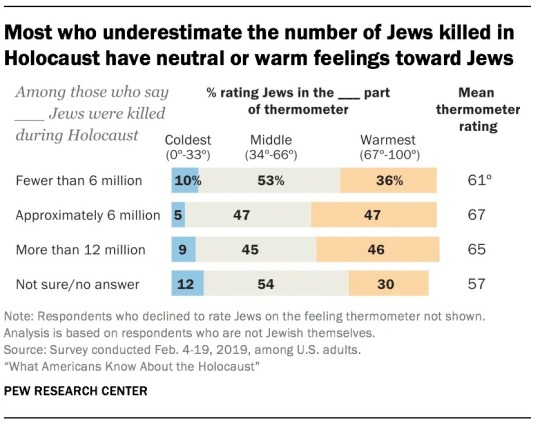
Most who underestimate the number of Jews killed in Holocaust have neutral or warm feelings toward Jews.
But it's not just ignorance; there's an entire industry that has been propped up and dedicated to Holocaust denial, complete with books, “movies,” and groups. To make matters worse, alarmingly, fewer Holocaust survivors are around to share their firsthand accounts and counteract the flames of denialism.
Nearly half of the 1000 people surveyed had stated that they’ve seen Holocaust denial or distortion posts on social media or elsewhere online.
I’ve always thought that denials of genocide—such as the Holocaust —were something that happened over time, with history slipping away and being re-written.
However, I never expected to be observing this in real time.
While initially the so-called “resistance” was celebrated by a subset of society, this soon turned into full-fledged denials of Hamas’ actions on Oct 7. Despite overwhelming evidence in the form of videos captured and shared by Hamas themselves and shared on Telegram channels and elsewhere, I would read and hear people claiming that they had only targeted Israeli military. Absurd claims emerged using supposedly ‘leaked’ footage where an Israeli helicopter shoots at Nova music festival goers. That video was viewed over 30 million times on X alone. The video, which was actually originally shared by the IDF on Oct 9, was showing their attacks on specific Gazan targets—certainly NOT indiscriminate bombings of music festival attendees in Israel. (Here’s a great thread that details how this piece of disinformation spread and geolocation information that further confirms that the claim is fake).
I’ve heard countless denials of the rapes of women (and men), despite overwhelming evidence in the form of physical evidence, forensics, and a number of witness testimonies. Women’s rights groups, meanwhile, remained silent—thus offering a vacuum for denialists to fill. Proponents of “me too” also stayed silent. Worse, the University of Alberta Sexual Assault Centre’s director signed an open letter calling Hamas perpetrating “sexual violence” an “unverified accusation.” It took UN Women nearly two months to issue a lukewarm condemnation of the brutal attacks. “We are alarmed by the numerous accounts of gender-based atrocities and sexual violence during those attacks,” they wrote, following a letter writing campaign urging them to speak up. Better late than never though, right?
The roughly 40 dead babies claim was debunked as a lie. At least that’s what people on social media now declare as fact, citing a Haaretz investigation.
“Haaretz investigation EXPOSES all the ISRAELI LIES from October 7th just like I predicated (sic),” reads the post of one particularly large disinformation account.
These claims persisted despite Haaretz directly addressing that post and calling it “blatant lies” and insisting that it “absolutely no basis in Haaretz’s reporting.”
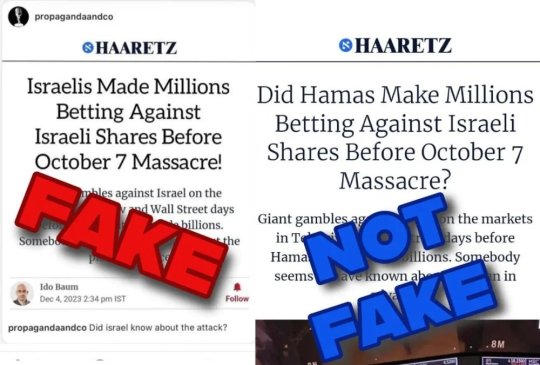
The denials continued regardless of the fact that a group of 200 forensic pathologists from all over the world had confirmed that babies were indeed murdered and that some babies were found decapitated, though it was unclear whether this was done before or after death. First responders also corroborated that they witnessed beheaded infants. Regardless of decapitation, these were babies, murdered.
The forensic pathologists also confirmed that humans were executed, bound and burned alive. Israeli police have over 1,000 statements related to the attack.
When some of the hostages were released, Hamas supporters claimed that the hostages enjoyed being held by them, that they hardly wanted to leave. That this was like a pleasant vacation for them, that’s all. Like sipping piña coladas by the beach. In fact, they would state that they were more concerned about their safety in Israeli hands. They even concocted stories of love affairs between a hostage who was shot in the leg and a Hamas captor. A sick and twisted take on reality where up is down, cats are dogs, and denial is truth. They dismissed the reality that many of these hostages watched their loved ones get murdered in front of them, and still had relatives being held in captivity. The hostages were also administered Clonazepam by Hamas, a mood-enhancing tranquilizing drug, before handing them over to the Red Cross, so that they would appear “happy.”
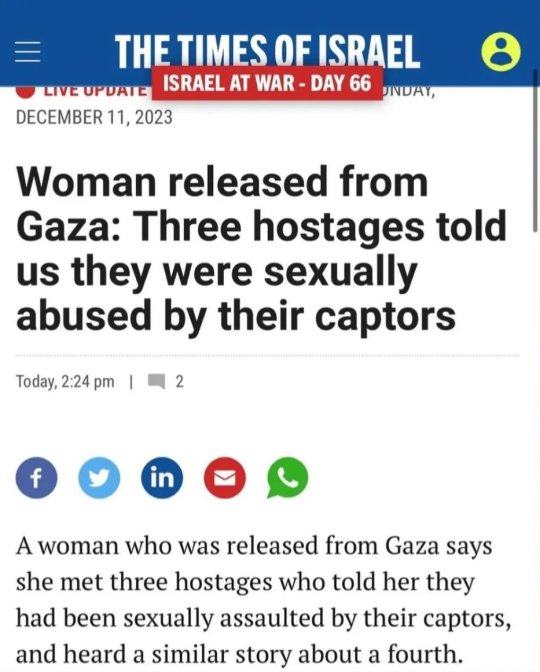
Meanwhile, the Yale Daily News published a correction of an opinion column stating that the “allegations had not been substantiated.”
The denials go on and on, and I can’t help but feel like I’m watching a version of Holocaust denial, except this time it’s happening in real time—not years after the fact. And this time, it has a Wi-Fi connection and a social media account.
The conditions for this were ripe. Moral relativism is why just several weeks ago, Gen Z embraced Bin Laden's 'Letter to America.' It has been building up for years across college campuses, a breeding ground for ideologies that support violent means to achieve political gains.
The perceived power dynamics play a role here too. In the eyes of many, the Israelis are seen as a superpower whereas the Palestinians, and by extension Hamas, are seen as underdogs. In their view, the underdog is always right because it is the victim, and the “power” is the oppressor. So how can the oppressor be a victim?
Israelis, despite the majority of the population being Mizrahi Jews, as well as 20% Arabs (who were also victims on Oct 7), have been framed as “white colonizers,” vs the Palestinians who are seen as “POC” in the context of this conflict. Never mind that Jews, including Ashkenazi Jews, can be traced back to the land through DNA, archaeological evidence, and historical documents.
An overall distrust for media is another factor, which has resulted in individuals taking the word of random influencer accounts as gospel over traditional media outlets. According to Gallup polls, Americans’ trust in media is near a record low. Only 34% of US adults have a “great deal” or “fair amount” of confidence as of 2022. This is a major hindrance to our sensemaking abilities.
And then, of course, there’s cognitive dissonance. When a group identifies so closely with the perpetrator and they commit heinous acts, confronting that fact happens to be uncomfortable. So, in an attempt to reduce that discomfort, they rationalize or deny the evidence. This means that they accept only evidence that supports their existing beliefs, while placing unreasonable demands on the other side.
But none of these factors would have gained as much traction if it weren’t for something that didn’t exist during the Holocaust: social media. This is the engine that helps drives this real-time historical revisionism and denialism. According to 2021 data from Pew Research, over 70% of Americans get their news via social platforms. A Reuters Institute report from 2023 found that 30% of respondents use social media as the main way to get their news.
We have a society that consumes sound-bites of information, both truth and lies (as well as lies based on grains of truth).
Social media algorithms—combined with human nature—tend to amplify outrageous untruths, which spread widely. Corrections, never make it as far as the original lie. They are just a faint hum.
Throughout the Israeli-Gaza war, we’ve seen AI generated images and bots used to paint a specific narrative—for evocative, emotional effect. But technologically sophisticatication isn’t a prerequisite for painting false narratives. Many “influencers” have taken to using existing images or videos and attaching misleading headlines to them—including sharing content that captures events in Syria while presenting it as taking place in Gaza. These networks of influencers have large reach, and can turn even the most blatant lie into a revisionist truth.
Researchers for Freedom House, a non-profit human right advocacy group, found that generally at least 47 governments have used commentators to manipulate online discussions in their favor, either via humans or bots. They’ve also recruited influencers to help spread false and misleading content, and have created fake websites that mimic actual media publications. Then there’s always Russia’s propaganda arm RT, and various other publications like Al Jazeera and Quds who have direct ties to Hamas and/or other Islamic regimes.
All of this has contributed to narrative confusion, and the erasure of unspeakable acts of brutality, and the denial of the facts of October 7, right before our very eyes.
If we cannot even share a common reality, how can have any hope of resolving anything?
“Never again” is happening now."
315 notes
·
View notes
Text
Sorry but I don't trust you if you think Azula was evil.
She was a fucking 14 year old girl and you lack literary comprehension if you think the narrative condemned her forever by the end. You're not supposed to be gloating over her crying and screaming desperately on the ground, knowing that no one loves her and she's lost everyone who might've even slightly cared about her.
I don't trust you if you spend your time arguing with people over whether or not she's a psychopath.
Yes she's a villain. Yes, she's done bad things. Really bad things.
But she was also a teenager who was warped by her father's abuse just as much as Zuko.
I once read a great comment about her that really summed up how I feel about the abuse of Ozai's children.
The only difference between them was that Azula had scars from their father that you cannot see.
Which is true, but you do see it by the end.
I don't know how anyone could watch Azula's breakdown and think this 14 year old is a bitch.
Not unless you're a misogynist and an idiot.
Also like wtf, look at Zuko and Katara's fucking faces.
They're our protagonists. They are OUR stand ins. They are looking on her with pity, not anger or pride or happiness. The music isn't triumphant. It's hollow and sad.
No.
I don't trust anyone who says Azula is just evil and was destined to be bad. I don't like people who say she was a psychopath from the start.
This isn't fucking bnha.
You don't have the right to enter my home!! You are rancid.
You are untrustworthy.
665 notes
·
View notes
Text
I don't want to see any of you usamericans talk about "punching nazis" ever again. I don't want to hear yall pat each other on the back and say shit like "If I had been alive during the holocaust I would have done something about it", or any other white savior shit like that.
You don't care about jews, you didn't care about them back then, just as you don't care about palestinians now. Yall repeat and repeat "the holocaust was terrible, we should condemn it", not because you care, but because it lifts yourselves up. Because it's the only war that the US won where they just happened to be on "the good side", so it portrays you as heroes, warriors of justice, which happens to be excelent propaganda material, so you exploit it. You make memorials, you make films, hundreds of them, fetishizing the jewish suffering and portraying yourselves as the force of good that saved them all. Meanwhile, dozens of other genocides - many of them even bigger and bloddier than the holocaust - happen around the world, many of them endorsed or supported by your government. But yall don't care. It's not the holocaust. You're not the good guys in this one so why bother making a movie, why pay atention to it at all? It's hard to keep track of everything happening in the world, it has nothing to do with you. So you just keep scrolling your socials paying no mind to whatever fucked up shit is happening out there, until you run into some fucker from the global south posting something mildly critical of israel, or about how the United States shamelessly exploits jewish history for the sake of warfare, or how victim mentality is a dangerous thing for a marginalized group to hold on to, and you get furious. How dare they say things that don't align with the narrative I've been fed my whole life?? They are anti-semitic!! They hate jews!! They are nazis!! And you tell them so, you put them in their place, because you are a democrat and a good guy and you won't tolerate nazis. And then you reblog "support our troops" posts and write letters to your president begging him to bomb brown people on the other side of the planet because they are terrorists, I think. And I'm here to tell you that you are not the good guy, you are not a hero. You are a victim of indoctrination and an idiot, and your domestic white politics mean absolutely nothing to the rest of the world.
Yes, I did watch Schindler's list. No, I don't hate jewish people. Yes, I'll aggresively condemn Israel's actions and anyone blind enough to say that one genocide justifies another, and I will always support palestinian people. And if you happen to be a jewish person that has somehow found themselves in the center of a conversation that isn't even about you, and getting negative attention you don't deserve, I'm sorry. I'm sorry that no matter what you do or where you live, you keep being used as a scapegoat and your life and history exploited for colonialist propaganda, your heritage is worth more than that.
So keep calling yourselves the good guys, keep pulling the anti-semite card or the "Palestine is homophobic" argument. Keep playing your white politics in your white country that you stole from non-white people. The rest of the world is watching you and history will remember you as what you are and always have been; fucking colonizers.
376 notes
·
View notes